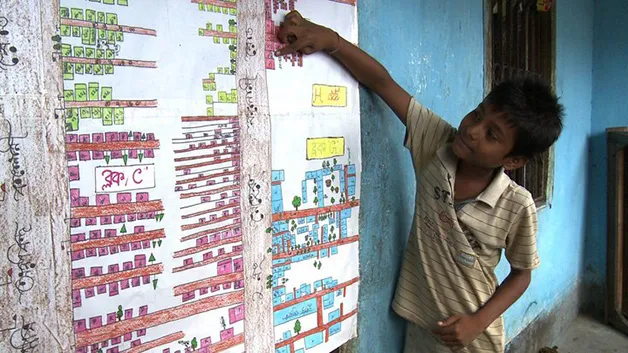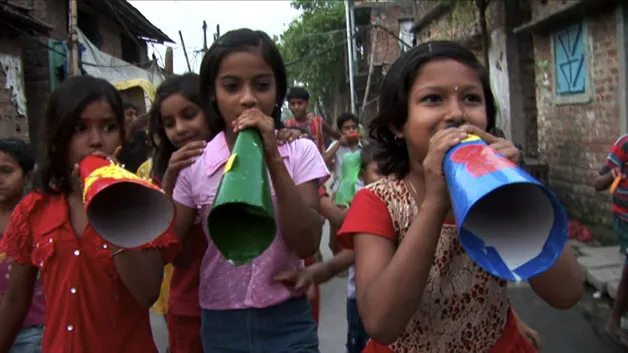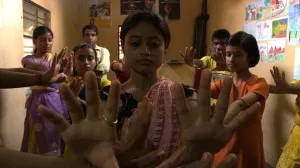Inspiring Stories - Part 3: four children are enabling change in the slums of Kolkata
What if you lived in a place that does not appear on the map? That question stimulated children living in one of the 5,500 slums of West Bengal’s capital Kolkata to create their own map because their houses did not appear on Google Maps.
It all started when they realized there was a void, a blank space where their community should be placed on the screen. 12-year-olds-best friends Shika and Salim then worked out to count every single house in every street and draw their own district map. The purpose was to organize a vaccination campaign against polio and, because of the kids’s appeal walking around the slum using cardboard megaphone to send their message, people could find the vaccination spots, creating a growth of impressive 80 per cent.

Five years ago, filmmakers Nicole Newnham and Maren Grainger-Monsen were searching the world for stories about agents of great change. After coming to know about Shika, Salim, Priyanka and Kajal, the directors spent a couple of years tracking the hardscrabble lives of these kids in Kolkata, a project which resulted in The Revolutionary Optimists, a character-driven documentary that reveals the work of Bengali visionary, Amlan Ganguly, a former attorney who empowers children to become change agents, battling poverty and transforming their neighborhoods with dramatic results. The doc won the Hilton Worldwide LightStay Sustainability Award at the Sundance Film Festival 2013.
Filmed over the course of three and a half years, The Revolutionary Optimists follows Amlan and four of the children he works with on an intimate journey through adolescence, as they challenge the idea that marginalization is written into their destiny.

Twelve-year-old Kajal works in a brick field, transporting sun-dried mud bricks, stacked atop her head, for $1.25 a day. Shika and Salim are neighbors in an area where there is no clean water; while more affluent denizens pay for water, they and their parents spend two hours a day fetching it from another quarter of the city. Priyanka is an abused teenager who teaches dance at Prayasam, a nonprofit serving impoverished, inner-city children.

Priyanka is the teenage leader of a dance group founded by Amlan to keep slum girls in school and dissuade them from early marriage. But Priyanka’s parents are abusing her and she sees only one way out – to marry her young boyfriend. Amlan fights to encourage Priyanka and the rest of the girls to stay in school and keep their eyes on her future. Priyanka’s eventual decision to elope breaks Amlan’s heart, but he resolves to keep fighting – for Priyanka’s children, who one day may know the kind of life he tried to help her lead.
Shika and Salim live in a neighborhood where everyone must walk 3 km at 4:00 every morning to take water from a neighboring slum. The film explores the cost of not having clean water on their families and lives, as it follows their incredible efforts to take action on the matter. By mapping their un-mapped community, and collecting data, Salim and Shika hope to convince the Colony Committee to give them a drinking water tap. Then fate intervenes, and they are tapped to speak in Delhi in front of Parliament on behalf of their group.
Using theater, dance and data, the children have cut malaria rates and turned garbage dumps into playing fields. Now, the quartet have set their sights on goals that push at the limits of optimism: trying to bring clean water to a long-denied slum and bringing education and hope to the migrant children working in brick fields on the outskirts of the booming city.
Inspired by The Revolutionary Optimists, the BAVC Producer’s Institute for New Technologies developed Map Your World, a multi-platform project that puts the power of new technologies into the hands of young change agents, enabling them to map, track, and improve the health of their own communities – and then share their stories of change with each other and with the world.
Using cell phones, youth can create customized surveys about public health issues or community issues of concern to them, and upload data at the moment of collection into a database that is linked to a digital online community map. The project leverages existing, proven technology, integrating Google maps, GPS, Android phones, and open source tool.
Watch The Revolutionary Optimists official trailer:
[youtube http://www.youtube.com/watch?v=Yx5_QQHUNLk?rel=0]







